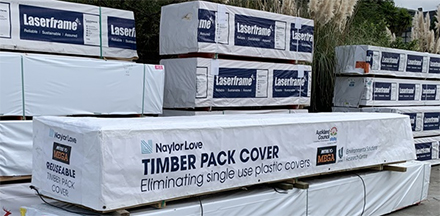 Construction and demolition waste contributes at least millions of tonnes to the amount of plastic landfilled. But, since construction waste is usually not sorted by material, there is limited data on the potential to divert materials from landfill. Source: Timberbiz
Construction and demolition waste contributes at least millions of tonnes to the amount of plastic landfilled. But, since construction waste is usually not sorted by material, there is limited data on the potential to divert materials from landfill. Source: Timberbiz
In New Zealand a joint project by Unitec, Mitre 10 MEGA and Naylor Love has been working to identify where and what types of plastic appear in building projects to design out waste where possible.
Construction timber is typically delivered to building sites in packs up to six meters long and covered in a plastic wrap to protect from weather elements while stored on site. The plastic wrap is discarded into the general waste bin and taken to landfill as there is no reuse stream available.
Funding from Auckland Council’s Waste Minimisation and Innovation Fund has allowed Naylor Love and Mitre 10 MEGA to trial an initiative that could transform the way timber is delivered and stored on construction sites all over the country.
Naylor Love and Mitre 10 have rolled out purpose-made Timber Pack Covers to replace this single use plastic. The covers are heavy duty and can be used many times over.
Naylor Love Project Manager Annie Day described the Timber Pack Covers as, “an ideal solution, eliminating single use plastic while ensuring that the timber is protected from knocks and weather both in transit and on site”.
Parul Sood, Auckland Council General Manager for Waste Solutions shares said that waste from construction and demolition represented more than double the total waste from all household collections in Auckland.
“So, industry leadership is needed. Auckland Council is keen to provide the incubation funding and bring partners together to identify the best opportunities to reduce waste,” he said.
Associate Professor Dr Terri-Ann Berry, Director of Environmental Solutions Research Centre at Unitec said Unitec’s research was most useful if it could be successfully applied to achieve the best outcomes.
“This involves working closely with industry, industry providers and regulators. It is great to see new solutions emerging from our research insights,” he said.
The Cover trial project fits neatly in Mitre 10’s sustainability plan, according to Sustainability Manager Julie Roberts.
“We’re working on several initiatives that address problematic waste streams with trade and industry partners, both customers and suppliers,” she said.
“Post-consumer solutions like the Timber Pack Covers and EXPOL’s polystyrene recycling program, alongside the work we’re doing to reduce and improve the packaging that comes into our business, are important steps on our sustainability journey.
“These innovations support the government’s focus on transitioning New Zealand to a circular economy.”





